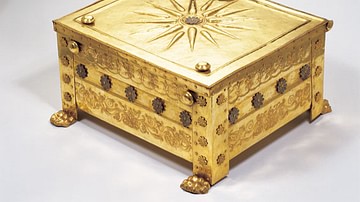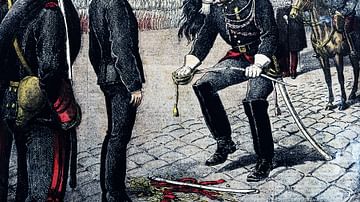Search
Search Results

Article
The Royal Macedonian Tombs at Vergina
Excavations at Vergina in northern Greece in the late 1970s CE unearthed a cluster of tombs thought to be the burial site of Philip II (r. 359-336 BCE), the father of Alexander the Great (r. 336-323 BCE), with a wife interred in a vaulted...

Definition
Gisela of France
Gisela of France was a legendary 10th-century CE Francian princess, who, according to tradition, was married off to Viking leader Rollo of Normandy. Her name, Gisela or Gisla, comes from an Old German word meaning "to pledge", the French...

Definition
Aetolian League
The Aetolian League was an ancient Greek alliance of the tribes that lived west of Athens and north of the Peloponnese. The league was probably first established in the early 4th century BCE, reached its peak during the Hellenistic Period...

Definition
William the Silent
William the Silent (l. 1533-1584, also known as William of Orange) was the leader of the Dutch Revolt (the Eighty Years' War) in the Netherlands; first politically (between 1559-1568) then militarily (between 1568-1584). He is among the most...

Image
Philip VI of France with David II of Scotland and Queen Joan
A 15th century CE manuscript illustration showing David II of Scotland (r. 1329-1371 CE) and Queen Joan kneeling before King Philip VI of France (r. 1328-1350 CE).

Article
France’s 1905 Law of Separation of Church and State
The 1905 Law of Separation of Church and State was enacted as the climax of decades of conflict between monarchists and anticlerical Republicans who viewed Christianity as a permanent obstacle to the social development of the Republic. The...

Article
The Dreyfus Affair & the Separation of Church and State in France
The Dreyfus Affair, or L'Affaire as it has become known, demonstrated the competing forces at work to either reestablish the monarchy and the Church in power or to solidify and advance the unfulfilled ideals of the 1789 French Revolution...

Article
French Involvement in the American Revolution
The involvement of France in the American War of Independence (1775-1783) was not only significant in the progress of the war itself but also as a critical moment for France. Whereas French intervention in the war would help turn the tide...

Article
Warrior Women of the World of Ancient Macedon
The 8th November is celebrated as Archangels Day in Greece, but on that November day in 1977 CE something remarkable happened: an excavation team led by Professor Manolis Andronikos were roped down into the eerie gloom of an unlooted Macedonian-styled...

Article
The Ancient Celtic Pantheon
The ancient Celtic pantheon consisted of over 400 gods and goddesses who represented everything from rivers to warfare. With perhaps the exception of Lugh, the Celtic gods were not universally worshipped across Iron Age Europe but were very...